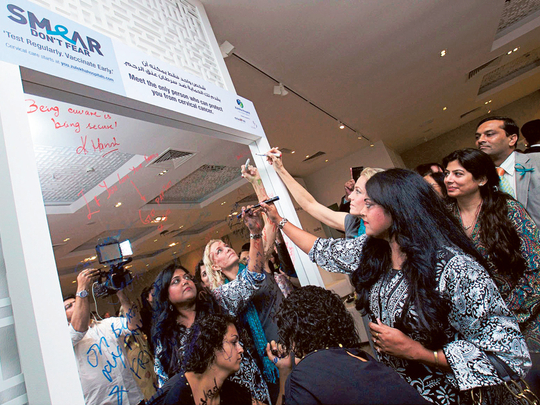
Dubai: About 100 women in the UAE are diagnosed each year with cervical cancer and almost 30 of these women will die and none of this is necessary because cervical cancer is preventable, said Dr Pamela Munster, Cancer Expert from the University of California in San Francisco.
The initiative titled ‘Smear, Don’t Fear’ is the second cervical cancer awareness campaign launched by Zulekha Hospital to provide preventive measures and pap smears to reduce the risk. During the conference held at the Dubai Ladies Club yesterday, Dr Munster explained that cervical cancer is one that appears on the neck of the uterus and it is a cancer that is contracted by a virus preventable through vaccination.
“The vaccination given to boys and girls at the age of nine or 10 will completely eradicate the virus that causes cervical cancer and regular pap smears, starting at the age when a woman gets married, every three years will eliminate the cancer,” she said.
Dr Munster witnessed a case where at the age of 34, a woman was presented with vaginal discharge and irregular bleeding but was too embarrassed and scared to visit a doctor.
When the patient finally approached her, Dr Munster revealed that the tumour had spread to her lungs and she passed away shortly after.
“Had she been vaccinated in her early teens or as a child, she wouldn’t have been at risk of getting cervical cancer. Had she had a Pap smear, we probably would have detected the cancer very early and eradicated it right then,” she explained.
Dr Munster clarified that even if a woman is diagnosed with cervical cancer at an early stage, it can be completely treated with minimal side effects.
Dr Laila Al Marzouqi, from the Dubai Health Authority, highlighted that cervical cancer should no longer be a social stigma.
“Some women are embarrassed to do pap smears but this campaign will educate people,” said Dr Laila. “Another aspect worth mentioning is the Human Papillomavirus (HPV) vaccinations which people are becoming aware of but more educational campaigns in schools are needed to encourage the vaccine.”
Dr Laila also mentioned that in the future, mobile services for cervical cancer detection will be made available in order for people to accept the reality gradually and come forward for screenings.
She clarified that in the past, it was considered socially unacceptable to speak about breast cancer. However, today, with rising awareness, discussing the issue in public spaces has become accepted. Dr Laila added that when trying to spread awareness about cervical cancer, methods must be culturally oriented.
Dr Munster revealed that seven to eight women out of 100,000 women in the UAE have cervical cancer and it can be eradicated easily. She also added that women are encouraged to do pap smears since men cannot be checked for the virus.
Maria Botros is a trainee at Gulf News












